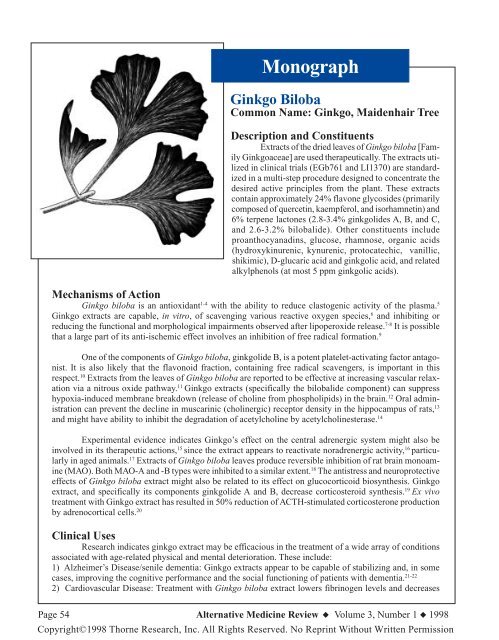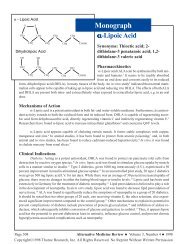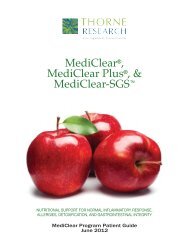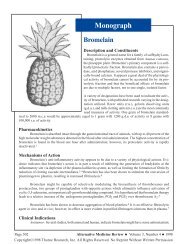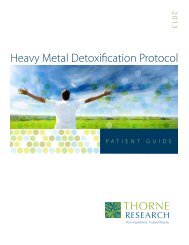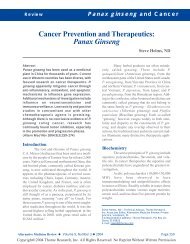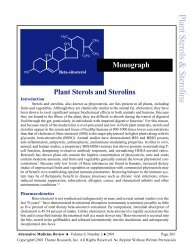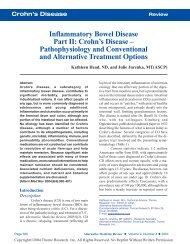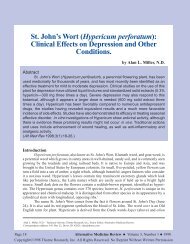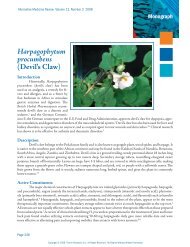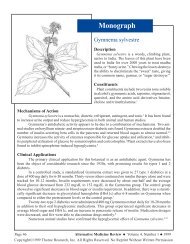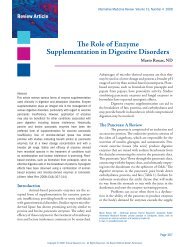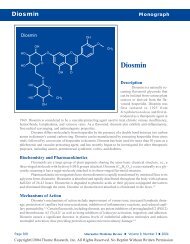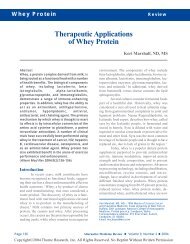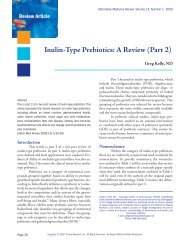Monograph - Thorne Research
Monograph - Thorne Research
Monograph - Thorne Research
You also want an ePaper? Increase the reach of your titles
YUMPU automatically turns print PDFs into web optimized ePapers that Google loves.
<strong>Monograph</strong><br />
Ginkgo Biloba<br />
Common Name: Ginkgo, Maidenhair Tree<br />
Description and Constituents<br />
Extracts of the dried leaves of Ginkgo biloba [Family<br />
Ginkgoaceae] are used therapeutically. The extracts utilized<br />
in clinical trials (EGb761 and LI1370) are standardized<br />
in a multi-step procedure designed to concentrate the<br />
desired active principles from the plant. These extracts<br />
contain approximately 24% flavone glycosides (primarily<br />
composed of quercetin, kaempferol, and isorhamnetin) and<br />
6% terpene lactones (2.8-3.4% ginkgolides A, B, and C,<br />
and 2.6-3.2% bilobalide). Other constituents include<br />
proanthocyanadins, glucose, rhamnose, organic acids<br />
(hydroxykinurenic, kynurenic, protocatechic, vanillic,<br />
shikimic), D-glucaric acid and ginkgolic acid, and related<br />
alkylphenols (at most 5 ppm ginkgolic acids).<br />
Mechanisms of Action<br />
Ginkgo biloba is an antioxidant 1-4 with the ability to reduce clastogenic activity of the plasma. 5<br />
Ginkgo extracts are capable, in vitro, of scavenging various reactive oxygen species, 6 and inhibiting or<br />
reducing the functional and morphological impairments observed after lipoperoxide release. 7-8 It is possible<br />
that a large part of its anti-ischemic effect involves an inhibition of free radical formation. 9<br />
One of the components of Ginkgo biloba, ginkgolide B, is a potent platelet-activating factor antagonist.<br />
It is also likely that the flavonoid fraction, containing free radical scavengers, is important in this<br />
respect. 10 Extracts from the leaves of Ginkgo biloba are reported to be effective at increasing vascular relaxation<br />
via a nitrous oxide pathway. 11 Ginkgo extracts (specifically the bilobalide component) can suppress<br />
hypoxia-induced membrane breakdown (release of choline from phospholipids) in the brain. 12 Oral administration<br />
can prevent the decline in muscarinic (cholinergic) receptor density in the hippocampus of rats, 13<br />
and might have ability to inhibit the degradation of acetylcholine by acetylcholinesterase. 14<br />
Experimental evidence indicates Ginkgo’s effect on the central adrenergic system might also be<br />
involved in its therapeutic actions, 15 since the extract appears to reactivate noradrenergic activity, 16 particularly<br />
in aged animals. 17 Extracts of Ginkgo biloba leaves produce reversible inhibition of rat brain monoamine<br />
(MAO). Both MAO-A and -B types were inhibited to a similar extent. 18 The antistress and neuroprotective<br />
effects of Ginkgo biloba extract might also be related to its effect on glucocorticoid biosynthesis. Ginkgo<br />
extract, and specifically its components ginkgolide A and B, decrease corticosteroid synthesis. 19 Ex vivo<br />
treatment with Ginkgo extract has resulted in 50% reduction of ACTH-stimulated corticosterone production<br />
by adrenocortical cells. 20<br />
Clinical Uses<br />
<strong>Research</strong> indicates ginkgo extract may be efficacious in the treatment of a wide array of conditions<br />
associated with age-related physical and mental deterioration. These include:<br />
1) Alzheimer’s Disease/senile dementia: Ginkgo extracts appear to be capable of stabilizing and, in some<br />
cases, improving the cognitive performance and the social functioning of patients with dementia. 21-22<br />
2) Cardiovascular Disease: Treatment with Ginkgo biloba extract lowers fibrinogen levels and decreases<br />
Page 54 Alternative Medicine Review ◆ Volume 3, Number 1 ◆ 1998<br />
Copyright©1998 <strong>Thorne</strong> <strong>Research</strong>, Inc. All Rights Reserved. No Reprint Without Written Permission
Ginkgo<br />
plasma viscosity. 23 Ginkgo administration might improve the clinical outcome following cardiopulmonary<br />
bypass by limiting oxidative stress. 24<br />
3) Cerebral vascular insufficiency and impaired cerebral performance: 25-26 Administration of Ginkgo biloba<br />
extracts has been shown to improve a variety of conditions associated with cerebral insufficiency, including<br />
visual field disturbances associated with chronic lack of bloodflow, 27 oculomotor and complex choice reaction,<br />
28 vigilance and reaction times, 29 depressive mood, 30 memory and mental performance, 31-32 dizziness, 32<br />
and decreased blood flow. 33<br />
Other therapeutic applications include:<br />
1) Congestive symptoms of premenstrual syndrome: Ginkgo extract was effective for the treatment of the<br />
congestive (particularly breast symptoms) and neuropsychological symptoms of PMS, 34 and in the alleviation<br />
of idiopathic cyclic oedema. 35<br />
2) Diabetes: Although human clinical trials have not been conducted, in experimental models, Ginkgo<br />
biloba extract appears to positively modify some complications associated with diabetes. 36-37<br />
3) Impotence 38<br />
4) Intermittent Claudication 39-40<br />
5) Liver Fibrosis: Ginkgo biloba was shown to be effective in arresting the development of liver fibrosis<br />
associated with chronic hepatitis B. 41<br />
6) Macular degeneration: In spite of the small population sample, a statistically significant improvement in<br />
long distance visual acuity was observed in patients with macular degeneration after treatment with Ginkgo<br />
biloba extract. 42<br />
7) Tinnitus: Studies have shown contradictory results in the treatment of tinnitus, which might be due to the<br />
diverse etiology of this condition. 43-46<br />
8) Vertigo/Equilibrium Disorders 47-48<br />
Dosage<br />
Generally recommended daily dosage is 40-80 mg of standardized extract two to three times daily.<br />
120-160 mg of the standardized extract bid or tid. Recommended dosage for Alzheimer’s Disease is at the<br />
higher end of this range or around 240 mg daily. In chronic conditions the extract should be administered for<br />
at least 6-8 weeks before evaluation of efficacy.<br />
Contraindications<br />
Ginkgo biloba should be avoided in patients with known hypersensitivity to the plant. The use of<br />
Ginkgo preparations during pregnancy and lactation has not been studied in humans.<br />
Side Effects<br />
Side effects are uncommon; however, gastrointestinal disturbances (nausea, vomiting, increased<br />
salivation, loss of appetite), headaches, dizziness, tinnitus, peripheral visual shimmering and hypersensitivity<br />
reactions, such as skin rash, have been reported to occur in some individuals.<br />
Drug/Nutrient Interactions<br />
The combined use of aspirin and Ginkgo biloba extracts has been reported to cause subdural hematomas<br />
in some individuals. 49 Although the bleeding has resolved after discontinuation of the Ginkgo<br />
biloba extract, this combination, or the use of Ginkgo biloba extract with other blood thinners should be<br />
avoided, or, if used, done with caution. 49 At least one case of retinal hemorrhage associated with Ginkgo and<br />
aspirin use has been reported.<br />
Alternative Medicine Review ◆ Volume 3, Number 1 ◆ 1998 Page 55<br />
Copyright©1998 <strong>Thorne</strong> <strong>Research</strong>, Inc. All Rights Reserved. No Reprint Without Written Permission
Toxicity Data<br />
The LD 50<br />
of Ginkgo biloba extract is 15.3 g/kg. No mutagenicity has been detected for the extract.<br />
The administration of the extract does not promote the effect of other mutagenic substances studied.<br />
References<br />
1. Rong Y, Geng Z, Lau BH. Ginkgo biloba attenuates oxidative stress in macrophages and endothelial cells. Free Radic Biol<br />
Med 1996;20:121-127.<br />
2. Yan LJ, Droy-Lefaix MT, Packer L. Ginkgo biloba extract (EGb 761) protects human low density lipoproteins against<br />
oxidative modification mediated by copper. Biochem Biophys Res Commun 1995;212:360-366.<br />
3. Shen JG, Zhou DY. Efficiency of Ginkgo biloba extract (EGb 761) in antioxidant protection against myocardial ischemia<br />
and reperfusion injury. Biochem Mol Biol Int 1995;35:125-134.<br />
4. Marcocci L, Packer L, Droy-Lefaix MT, et al. Antioxidant action of Ginkgo biloba extract EGb 761. Methods Enzymol<br />
1994;234:462-475.<br />
5. Emerit I, Oganesian N, Sarkisian T, et al. Clastogenic factors in the plasma of Chernobyl accident recovery workers:<br />
anticlastogenic effect of Ginkgo biloba extract. Radiat Res 1995;144:198-205.<br />
6. Maitra I, Marcocci L, Droy-Lefaix MT, Packer L. Peroxyl radical scavenging activity of Ginkgo biloba extract EGb 761.<br />
Biochem Pharmacol 1995;49:1649-1655.<br />
7. Dumont E, D’Arbigny P, Nouvelot A. Protection of polyunsaturated fatty acids against iron-dependent lipid peroxidation<br />
by a Ginkgo biloba extract (EGb 761). Methods Find Exp Clin Pharmacol 1995;17:83-88.<br />
8. Droy-Lefaix MT, Cluzel J, Menerath JM, et al. Antioxidant effect of a Ginkgo biloba extract (EGb 761) on the retina. Int J<br />
Tissue React 1995;17:93-100.<br />
9. Pietri S, Maurelli E, Drieu K, Culcasi M. Cardioprotective and anti-oxidant effects of the terpenoid constituents of Ginkgo<br />
biloba extract (EGb 761). J Mol Cell Cardiol 1997;29:733-742.<br />
10. Smith PF, Maclennan K, Darlington CL. The neuroprotective properties of the Ginkgo biloba leaf: a review of the<br />
possible relationship to platelet-activating factor (PAF). J Ethnopharmacol 1996;50:131-139.<br />
11. Chen X, Salwinski S, Lee TJ. Extracts of Ginkgo biloba and ginsenosides exert cerebral vasorelaxation via a nitric oxide<br />
pathway. Clin Exp Pharmacol Physiol 1997;24:958-959.<br />
12. Klein J, Chatterjee SS, Loffelholz K. Phospholipid breakdown and choline release under hypoxic conditions: inhibition by<br />
bilobalide, a constituent of Ginkgo biloba. Brain Res 1997;755:347-350.<br />
13. Taylor JE. Neuromediator binding to receptors in the rat brain. The effect of chronic administration of Ginkgo biloba<br />
extract. Presse Med 1986;15:1491-1493. [Article in French]<br />
14. Chopin P, Briley M. Effects of four non-cholinergic cognitive enhancers in comparison with tacrine and galanthamine on<br />
scopolamine-induced amnesia in rats. Psychopharmacology (Berl) 1992;106:26-30.<br />
15. Brunello N, Racagni G, Clostre F, et al. Effects of an extract of Ginkgo biloba on noradrenergic systems of rat cerebral<br />
cortex. Pharmacol Res Commun 1985;17:1063-1072.<br />
16. Racagni G, Brunello N, Paoletti R. Neuromediator changes during cerebral aging. The effect of Ginkgo biloba extract.<br />
Presse Med 1986;15:1488-1490. [Article in French]<br />
17. Huguet F, Tarrade T. Alpha 2-adrenoceptor changes during cerebral aging. The effect of Ginkgo biloba extract. J Pharm<br />
Pharmacol 1992;44:24-27.<br />
18. White HL, Scates PW, Cooper BR. Extracts of Ginkgo biloba leaves inhibit monoamine oxidase. Life Sci 1996;58:1315-<br />
1321.<br />
19. Amri H, Ogwuegbu SO, Boujrad N, et al. In vivo regulation of peripheral-type benzodiazepine receptor and glucocorticoid<br />
synthesis by Ginkgo biloba extract EGb 761 and isolated ginkgolides. Endocrinology 1996;137:5707-5718.<br />
20. Amri H, Drieu K, Papadopoulos V. Ex vivo regulation of adrenal cortical cell steroid and protein synthesis, in response to<br />
adrenocorticotropic hormone stimulation, by the Ginkgo biloba extract EGb 761 and isolated ginkgolide B. Endocrinology<br />
1997;138:5415-5426.<br />
21. Le Bars PL, Katz MM, Berman N, et al. A placebo-controlled, double-blind, randomized trial of an extract of Ginkgo<br />
biloba for dementia. North American EGb Study Group. JAMA 1997;278:1327-1332.<br />
22. Kanowski S, Herrmann WM, Stephan K, et al. Proof of efficacy of the Ginkgo biloba special extract EGb 761 in outpatients<br />
suffering from mild to moderate primary degenerative dementia of the Alzheimer type or multi-infarct dementia.<br />
Pharmacopsychiatry 1996;29:47-56.<br />
23. Witte S, Anadere I, Walitza E. Improvement of hemorheology with Ginkgo biloba extract. Decreasing a cardiovascular<br />
risk factor. Fortschr Med 1992;110:247-250. [Article in German]<br />
Page 56 Alternative Medicine Review ◆ Volume 3, Number 1 ◆ 1998<br />
Copyright©1998 <strong>Thorne</strong> <strong>Research</strong>, Inc. All Rights Reserved. No Reprint Without Written Permission
Ginkgo<br />
24. Pietri S, Seguin JR, d’Arbigny P, et al. Ginkgo biloba extract (EGb 761) pretreatment limits free radical-induced oxidative<br />
stress in patients undergoing coronary bypass surgery. Cardiovasc Drugs Ther 1997;11:121-131.<br />
25. Kleijnen J, Knipschild P. Ginkgo biloba for cerebral insufficiency. Br J Clin Pharmacol 1992;34:352-358.<br />
26. Gerhardt G, Rogalla K, Jaeger J. Drug therapy of disorders of cerebral performance. Randomized comparative study of<br />
dihydroergotoxine and Ginkgo biloba extract. Fortschr Med 1990;108:384-388. [Article in German]<br />
27. Raabe A, Raabe M, Ihm P. Therapeutic follow-up using automatic perimetry in chronic cerebroretinal ischemia in elderly<br />
patients. Prospective double-blind study with graduated dose Ginkgo biloba treatment. Klin Monatsbl Augenheilkd<br />
1991;199:432-438. [Article in German]<br />
28. Schaffler K, Reeh PW. Double blind study of the hypoxia protective effect of a standardized Ginkgo biloba preparation<br />
after repeated administration in healthy subjects. Arzneimittelforschung 1985;35:1283-1286. [Article in German]<br />
29. Gessner B, Voelp A, Klasser M. Study of the long-term action of a Ginkgo biloba extract on vigilance and mental<br />
performance as determined by means of quantitative pharmaco-EEG and psychometric measurements.<br />
Arzneimittelforschung 1985;35:1459-1465.<br />
30. Eckmann F. Cerebral insufficiency– treatment with Ginkgo-biloba extract. Time of onset of effect in a double-blind study<br />
with 60 inpatients. Fortschr Med 1990;108:557-560. [Article in German]<br />
31. Grassel E. Effect of Ginkgo-biloba extract on mental performance. Double-blind study using computerized measurement<br />
conditions in patients with cerebral insufficiency. Fortschr Med 1992;110:73-76. [Article in German]<br />
32. Hofferberth B. The effect of Ginkgo biloba extract on neurophysiological and psychometric measurement results in<br />
patients with psychotic organic brain syndrome. A double-blind study against placebo. Arzneimittelforschung<br />
1989;39:918-922. [Article in German]<br />
33. Koltringer P, Eber O, Klima G, et al. Microcirculation in parenteral Ginkgo biloba extract therapy. Wien Klin Wochenschr<br />
1989;101:198-200 [Article in German]<br />
34. Tamborini A, Taurelle R. Value of standardized Ginkgo biloba extract (EGb 761) in the management of congestive<br />
symptoms of premenstrual syndrome. Rev Fr Gynecol Obstet 1993;88:447-457. [Article in French]<br />
35. Lagrue G, Behar A, Kazandjian M, Rahbar K. Idiopathic cyclic edema. The role of capillary hyperpermeability and its<br />
correction by Ginkgo biloba extract. Presse Med 1986;15:1550-1553. [Article in French]<br />
36. Apaydin C, Oguz Y, Agar A, et al. Visual evoked potentials and optic nerve histopathology in normal and diabetic rats and<br />
effect of Ginkgo biloba extract. Acta Ophthalmol (Copenh) 1993;71:623-628.<br />
37. Doly M, Droy-Lefaix MT, Bonhomme B, Braquet P. Effect of Ginkgo biloba extract on the electrophysiology of the<br />
isolated retina from a diabetic rat. Presse Med 1986;15:1480-1483. [Article in French]<br />
38. Sikora R, Sohn M, Deutz FJ, et al. Ginkgo biloba extract in the therapy of erectile dysfunction. J Urol 1989;141:188.<br />
[abstract]<br />
39. Ernst E. Ginkgo biloba in treatment of intermittent claudication. A systematic research based on controlled studies in the<br />
literature. Fortschr Med 1996;114:85-87. [Article in German]<br />
40. Blume J, Kieser M, Holscher U. Placebo-controlled double-blind study of the effectiveness of Ginkgo biloba special<br />
extract EGb 761 in trained patients with intermittent claudication. Vasa 1996;25:265-274. [Article in German]<br />
41. Li W, Dai QT, Liu ZE. Preliminary study on early fibrosis of chronic hepatitis B treated with Ginkgo biloba Composita.<br />
Chung Kuo Chung Hsi I Chieh Ho Tsa Chih 1995;15:593-595. [Article in Chinese]<br />
42. Lebuisson DA, Leroy L, Rigal G. Treatment of senile macular degeneration with Ginkgo biloba extract. A preliminary<br />
double-blind drug vs. placebo study. Presse Med 1986;15:1556-1558. [Article in French]<br />
43. Holgers KM, Axelsson A, Pringle I. Ginkgo biloba extract for the treatment of tinnitus. Audiology 1994;33:85-92.<br />
44. Meyer B. Multicenter randomized double-blind drug vs. placebo study of the treatment of tinnitus with Ginkgo biloba<br />
extract. Presse Med 1986;15:1562-1564. [Article in French]<br />
45. Meyer B. A multicenter study of tinnitus. Epidemiology and therapy. Ann Otolaryngol Chir Cervicofac 1986;103:185-<br />
188. [Article in French]<br />
46. Jastreboff PJ, Zhou S, Jastreboff MM, et al. Attenuation of salicylate-induced tinnitus by Ginkgo biloba extract in rats.<br />
Audiol Neurootol 1997;2:197-212.<br />
47. Claussen CF. Diagnostic and practical value of craniocorpography in vertiginous syndromes. Presse Med 1986;15:1565-<br />
1568. [Article in French]<br />
48. Haguenauer JP, Cantenot F, Koskas H, Pierart H. Treatment of equilibrium disorders with Ginkgo biloba extract. A<br />
multicenter double-blind drug vs. placebo study. Presse Med 1986;15:1569-1572 [Article in French]<br />
49. Rowin J, Lewis SL. Spontaneous bilateral subdural hematomas associated with chronic Ginkgo biloba ingestion.<br />
Neurology 1996;46:1775-1776.<br />
Alternative Medicine Review ◆ Volume 3, Number 1 ◆ 1998 Page 57<br />
Copyright©1998 <strong>Thorne</strong> <strong>Research</strong>, Inc. All Rights Reserved. No Reprint Without Written Permission


